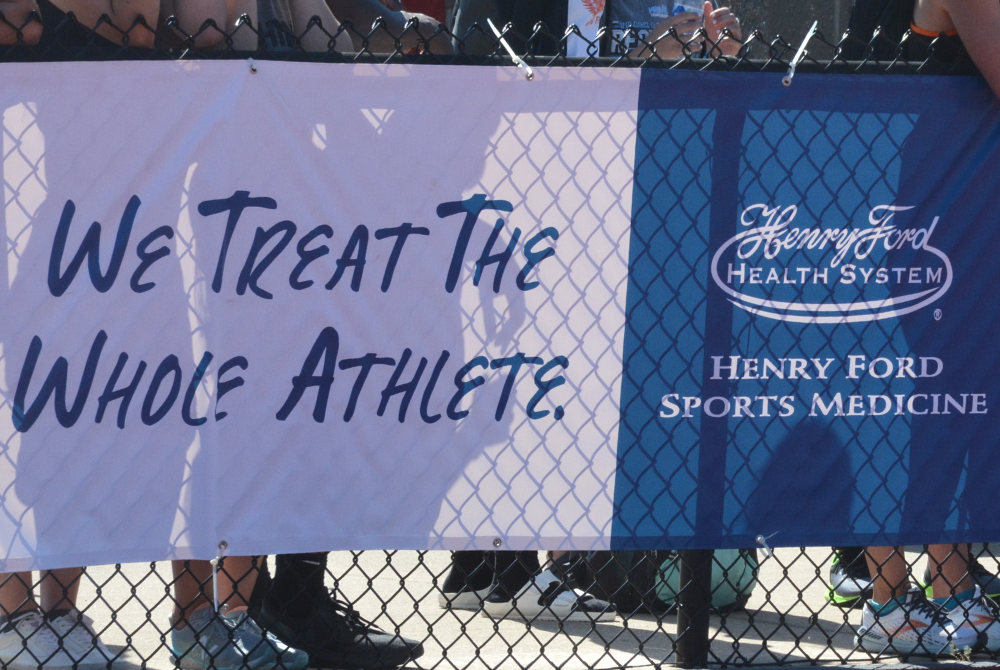
How Exercise Can Help Reduce Your Anxiety
January 6, 2022
Stress and anxiety at any level can be hard to manage. If you’re searching for relief, try turning to exercise. Even the smallest amount of physical activity can make a significant difference and reduce stress.
“Anxiety affects our minds and bodies. Exercise can serve as a natural antidepressant, boosting our mood at the same time it improves our health,” said Megan LaDrigue, ATC CSCS, an athletic trainer at Henry Ford Health System. “You don’t need to join a gym to exercise. The world is full of opportunities to be more active. You can add in short exercise sessions throughout the day to recharge your mood and energy.”
How Anxiety Impacts Your Health
If not addressed, anxiety can impact your mental and physical health. “Anxiety causes an imbalance in the chemicals and hormones that support our brain, immune system, digestive health and sleep,” said LaDrigue.
Chronic stress can lower our feel-good hormones – serotonin, dopamine and epinephrine. At the same time, the stress hormone cortisol increases when we’re under pressure or anxious. As a result of these shifts, you may experience:
► Trouble concentrating and loss of productivity at work or school
► Irritability and moodiness
► Difficulty sleeping
► Weight gain and digestive problems
► High blood pressure and increased risk for other diseases
How Exercise Can Break The Stress Cycle
“By adding exercise into your daily routine, you can begin to manage anxiety and improve your overall health,” said Ladrigue. Exercise offers many benefits, including:
► Shifting your focus: Focusing on your physical activity is a chance to take a mental break from daily tasks and recharge.
► Improving mood and confidence: When you exercise, your heart contracts more frequently, increasing blood flow to the brain and triggering changes in those feel-good chemicals. These changes improve mood and confidence. Over time, exercise can also help build resilience by increasing your ability to tolerate stress.
► Enhancing concentration and productivity: Exercise activates the areas in the brain that control how we think and act. For example, physical activity can improve your ability to plan, organize and monitor behavior and tasks.
► Improving sleep: Fatigue can increase feelings of stress and anxiety, which increase your risk for insomnia or poor sleep. Exercise improves your ability to get the quality, restorative sleep that you need to recharge your mind and body.
3 Steps To Starting An Anxiety-Fighting Exercise Routine
The U.S. Department of Health and Human Services recommends adults get 150 minutes of moderate exercise per week. “But you don’t need to do all of that exercise at once. If you’re just getting started, gradually build exercise into your daily routine to create a healthy habit,” LaDrigue said.
Ladrigue recommends these three steps to build an anxiety-busting fitness routine:
- Make it fun: Whether it’s walking or weightlifting, if exercise doesn’t inspire you and make you feel good, it won’t help you manage anxiety. If being social helps motivate you, find a workout buddy and encourage each other to keep moving. Explore new types of exercise by taking an online or in-person fitness class.
- Create a flexible schedule: If finding time in your day to exercise adds to your stress, try working in shorter activity periods. Do some stretches while you’re waiting for the coffee to brew. Take a walk during lunch or while you’re talking on the phone. Use the stairs instead of the elevator. Park your car farther away from your destination and walk the extra distance.
- Set goals: Start by setting short-term goals for your fitness routine. Record your progress to stay focused and motivated. As exercise becomes a daily habit, set longer-term goals. For example, try a community walk or run, join a hiking club or participate in a local sports league.
Build An Effective Workout Plan
If you’re new to exercise or have an underlying health condition, check with your primary care physician before starting a fitness routine. Had an injury in the past? See a physical therapist or sports medicine provider to avoid future injuries.
If you’ve taken a break from exercise or are exercising for the first time, start slowly. Over time, you can gradually increase the time and intensity of your workout to meet your goals.
When picking an exercise program, Ladrigue suggests including these elements:
► Warm up: Start with five minutes of activity like jumping jacks or running in place to increase the blood flow to your muscles.
► Dynamic stretching: Gently move through small or large ranges of motion to elongate the muscle tissue. For example, you can try arm circles or walking quad stretches to get your muscles warmed up.
► Strength training: If you’re new to strength training, start with light weights. You can start with three sets of 10 repetitions for each muscle group. Combine sets for a muscle group on the front of the body immediately followed with a set for a muscle group on the back of the body, like biceps and triceps. This approach is called “super-setting.” It keeps your heart rate elevated while giving the working muscle group time to recover. It also increases your metabolic burn, the rate at which you burn calories during exercise.
► Aerobic activity: Choose from a variety of activities, like walking, running, biking, swimming or dancing. Light- to moderate-intensity exercise can help you recover at the end of a strength training workout while increasing oxygen and blood flow to the working tissues.
► Cool down: Hold stretches for 20 to 30 seconds to elongate the muscle tissue used in your workout. This type of stretching helps prevent or minimize soreness.
“While starting a new habit like exercise can seem daunting, stay positive. Feel empowered – you’re taking steps that will improve your overall mental and physical health for years to come,” said LaDrigue.
To find a primary care or sports medicine specialist at Henry Ford, visit henryford.com or call 1-800-436-7936.
Megan LaDrigue is an athletic trainer who works with the Henry Ford Sports Medicine Sports Performance Program.

How Can COVID-19 Impact Student-Athletes' Return-To-Play?
October 5, 2021
COVID-19 And Student Athletes: How Can the Virus Impact Return-To-Play?
The end of summer marked the start of the school year, and for student athletes, the kickoff of the fall sports season. For many, COVID-19 sidelined practices, team gatherings and games to some extent last year. And while there is still hope that young athletes will have more opportunity to play this season despite rising cases of the Delta variant, there are other factors causing concern among athletes and their parents.
According to Ramsey Shehab, M.D., a sports medicine physician for Henry Ford Health System, many athletes are concerned about reaching peak performance after a long time off or after they have recovered from a COVID diagnosis. He reassures students that the feeling of exhaustion or even underperformance compared to past years is to be expected when you take time off or after fighting an illness.
“When you are infected with a virus, it taxes your immune system, and all of your energy goes towards fighting off that infection,” says Dr. Shehab. “You’ll likely feel weak and more tired during this time.”
Fortunately, as the body begins to recover, you’ll start to feel more like yourself again as you get your energy back. But this doesn’t mean that you won’t lose some of that fitness and endurance you’ve built up.
“It only takes about a week of deconditioning to set you back from peak athletic abilities,” says Dr. Shehab. “It is completely expected that your body will need time to get back to performing at your best.”
Playing Sports After Recovering From COVID-19
The unfortunate news: COVID-19 affects people differently in the long term. Some people are able to recover and get back to their routine without delay, whereas others see further complications months after an infection.
Akshay Khandelwal, M.D., a cardiologist with Henry Ford Health System, breaks down some of the more serious findings regarding COVID-19 and your heart health.
“With COVID-19, there is a risk of direct injury like heart failure or an arrhythmia due to the stress your body is under while fighting off the virus,” says Dr. Khandelwal. “As a result, having the virus can cause inflammation of the heart, a condition called myocarditis.”
Because of this, talking to your doctor before returning to a sport is a must if you had COVID or are recovering from the virus. It is important to make sure there are no systemic changes to your body such as overall heart health and lung function. They will be able to rule out any long-term effects that could impact your fitness output.
Expert-Recommended Steps for Return-To-Play
As you get back to your game, both experts share their insights for a healthy recovery:
1. Take quarantine periods seriously. If you are sick, even if you don’t necessarily feel sick, make sure you are taking time to rest and recover properly. “Don’t try to push or overexert yourself,” says Dr. Khandelwal. “It could prolong your recovery.”
2. Get back to training slowly. “Start using low-exertion activities to get your body used to working out again,” says Dr. Shehab. “Once you are able to handle each activity, you can push ahead to something more challenging.” Realistically, it may take a couple of weeks before you are able to get back to your peak.
3. Listen to your body. If workouts seem increasingly difficult, talk with your doctor or trainer before pushing yourself further. You can also help your body recover by making healthy, thoughtful choices:
► Get plenty of sleep
► Warm up and cool down before and after workouts
► Stay hydrated
► Take breaks when you’re tired
► Practice injury prevention
► Make smart food choices
4. Get vaccinated. If medical or religious reasons, or age requirements aren’t stopping you from getting the vaccine, consider getting the shot for yourself and those around you. The Delta variant is highly transmittable, meaning that, it is much easier for it to spread to teammates and family members than the original strain of the virus.
To learn more about the COVID-19 vaccine, visit our Vaccine FAQs page.
Talk to your doctor to learn more about safely returning to a sport. To find a doctor, visit henryford.com or call 1-800-436-7936.
Dr. Ramsey Shehab is the deputy chief of Sports Medicine at Henry Ford Health System. He sees patients at the Henry Ford Center for Athletic Medicine and Henry Ford Medical Center - Bloomfield Township.
Dr. Akshay Khandelwal is an interventional cardiologist who sees patients at Henry Ford Medical Center – Second Avenue.


